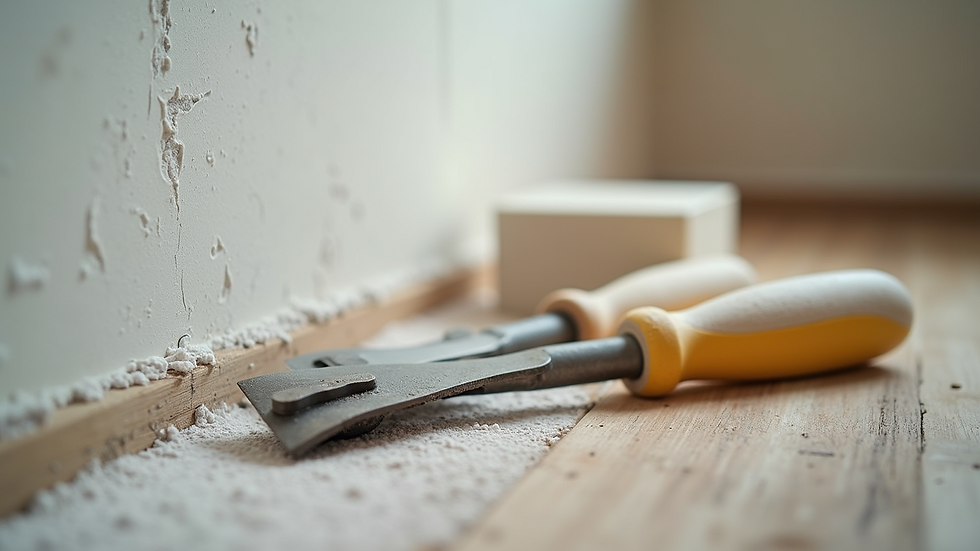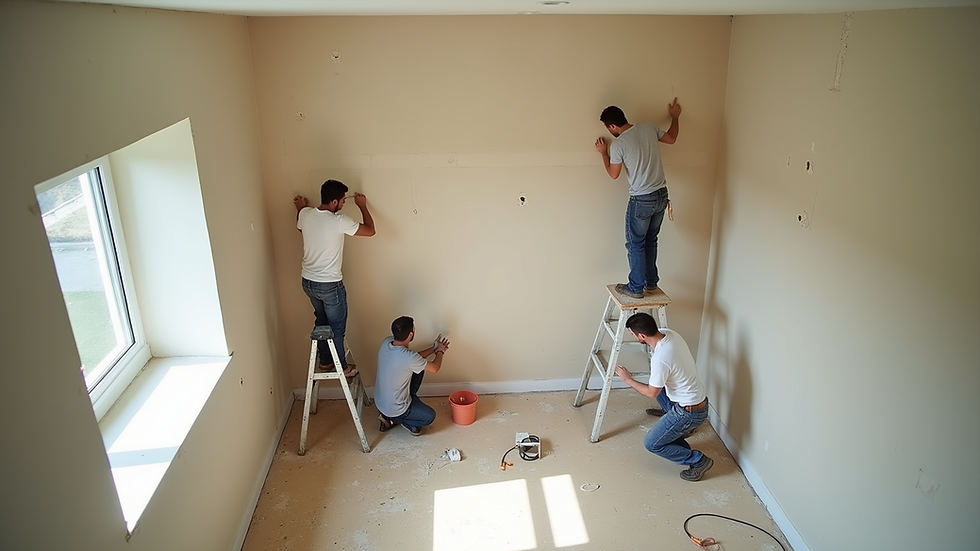Understanding the Pros and Cons of Drywall Services
- Samuel B.
- Sep 5, 2025
- 4 min read
Updated: Sep 6, 2025
Drywall services play a crucial role in construction and renovation projects. They provide a smooth surface for walls and ceilings that can transform any space. Whether you are building a new home, renovating a room, or fixing damaged walls, knowing the strengths and weaknesses of drywall can guide your decisions effectively. In this post, we will explore the benefits and drawbacks of drywall services, equipping you with insights for your next project. If you prefer a professional team, check DBG Contracting’s full list of Services.
What is Drywall?
Drywall, also known as gypsum board, is made of a gypsum plaster core sandwiched between two sheets of heavy paper. This building material is favored in both residential and commercial construction because it is versatile, easy to install, and economical.
You might find drywall used everywhere, from interior walls and ceilings to even as a base for tiles in kitchens and bathrooms. About 80% of new homes built in the U.S. utilize drywall for these reasons, making it a staple in modern construction.
Pros of Drywall Services
1. Cost-Effective Solution
One of the primary benefits of drywall services is their affordability. For example, the cost of drywall installation averages between $1.50 and $3.00 per square foot, which is significantly lower than traditional plastering that can range from $4.00 to $8.00 per square foot. This makes drywall a budget-friendly choice for both homeowners and contractors.
Additionally, because drywall installation is less labor-intensive, you can save on labor costs, leading to an overall reduction in project expenses.
2. Quick Installation
Drywall installation is known for its speed. A skilled crew can install large sheets quickly—often finishing a standard room in a day—so it accelerates project timelines. If you need fast interior work (plus finish carpentry and trim), DBG’s Millwork and Painting teams can handle the next steps after drywall.
Furthermore, drywall can be easily cut to fit different spaces, allowing for flexibility in design and execution.
3. Fire Resistance
Many drywall products are designed to be fire-resistant, offering important safety features for both homes and commercial spaces. Fire-rated drywall can slow down the spread of flames, giving individuals precious time to evacuate during a fire.
This aspect is particularly significant in multi-family residences, where fire codes may require fire-resistant materials to meet safety regulations. Statistically, structures that incorporate fire-rated drywall can reduce fire-related property damage by up to 50%.
4. Soundproofing Qualities
Specific types of drywall provide excellent soundproofing, making them ideal for shared living spaces or busy commercial environments. For instance, using soundproof drywall can reduce noise transmission by up to 70% compared to regular drywall. This feature is particularly useful for home theaters or offices needing privacy.
When you invest in soundproof drywall, you create a more serene atmosphere that can enhance comfort and productivity.
5. Easy to Repair
Drywall is easy to patch and repair: small holes and dings are inexpensive and quick to fix. After repairs, professional finishing and painting restore the surface—see DBG’s Painting page for finishing options.
This ease of repair is especially beneficial in homes with children and pets, where wear and tear are common. Simple repair jobs can often be completed in just a few hours.

Cons of Drywall Services
1. Susceptibility to Moisture
Standard drywall is vulnerable to moisture and can deteriorate or foster mold in humid areas. Moisture-resistant boards (greenboard, purple board) cost more but are recommended for bathrooms and kitchens—if you’re remodeling wet areas, check DBG’s Bathroom and Kitchen pages for integrated solutions.
2. Limited Structural Support
Drywall is a finish material and does not provide structural support; heavy items (cabinets, TVs) require blocking or reinforced framing behind the drywall. For built-ins and cabinetry that need backing, DBG’s Millwork team can design proper supports.
3. Vulnerability to Impact Damage
Regular drywall can be damaged easily by impacts, such as furniture being moved or playful children. Although minor repairs are manageable, frequent damage might lead to higher maintenance costs and extra work over time.
4. Dust and Mess During Installation
Taping, sanding, and finishing drywall generates dust. Proper containment and ventilation are important when renovating occupied homes—professional crews will manage cleanup and protect adjoining spaces (e.g., when finishing a basement, see DBG’s Basements).
5. Requires Finishing
Drywall demands taping, mudding, sanding and finishing before painting or wallpapering—this adds time and, if done professionally, additional cost. After finishing, painting and trim work complete the look—DBG’s Painting and Millwork services cover those trades.

Choosing the Right Drywall Service
When it comes to drywall services, choosing the right contractor is vital. Here are some steps to help you find the best option:
1. Research and Reviews
Begin by looking up local drywall contractors and reading customer reviews. Focus on companies known for delivering quality work and excellent customer service.
2. Get Multiple Quotes
Request quotes from several contractors to compare their prices and services. This will help you understand market rates, ensuring you get a fair deal.
3. Ask About Experience
Inquire about the contractor’s experience with drywall installation and repairs. A seasoned professional will be able to handle different types of projects and challenges.
4. Check for Licensing and Insurance
Ensure that your chosen contractor is licensed and insured. This protects you from liability in case of accidents or damage during the project.
5. Review the Contract
Before signing any contracts, read the terms carefully. Make sure all project details, including cost, timeline, and warranties, are clear.
If your drywall work is part of a larger remodel (kitchens, bathrooms, basements, home offices), using a full-service contractor can simplify coordination—DBG handles drywall as part of broader projects (kitchen, bathroom, flooring and finish work). See DBG’s Request a Quote form to start.

Wrapping Up
Drywall services provide many advantages, such as affordability, quick installation, and fire resistance. However, they also have some downsides, including vulnerability to moisture and potential impact damage. By weighing the pros and cons of drywall services, you can make informed decisions for your project.
If you want professional drywall installation, repairs, or a full renovation package (including painting, millwork, flooring or basement finishing), DBG Contracting offers those services and can provide a free estimate via their Request a Quote page.



